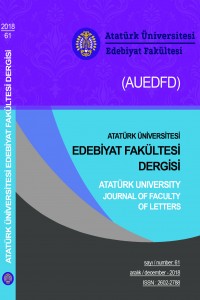Abstract
Bu makale açıklama inceleme metodundan istifade ederek, öne çıkan en önemli özelliği akılcılık olan İran medeniyetinin altın çağına damgasını vuran Firdevsi’ye ilişkin olup, onun varisi olduğu eski İran kültüründe aklın zirve yapmış olmasının ya da seçtiği şii mezhebinde akla verilen önemin, akılcılığı ve bilgeliği şahsi yeteneğine bağlı olan bu Tuslu bilgeyi, aklın sevilmeyen menfi yönlerine dikkat çekmekten alıkoyamadığını gözler önüne sermektedir. Bu yüzden genel kanının aksine, Şahnâme’de sadece aklın övgüsü yer almayıp aklın yerilen yönlerine ve aklın afetlerine de yer verilmiştir.
Bu makalenin bulguları, ازو شادمانی و زوست غمیست و زویت فزونی و هم
زو کمیست Şahnâme’nin mukaddime beyti olan bu beytin anlam ve okunuşundaki ibhamı kaldırıp, Firdevsî perspektifinden aklın afetlerini tanıma husu-sunda ilgililerin dikkatini çekecektir.
Yazar, Şahnâmecilerin araştırmalarındaki bulgulara göz attıktan sonra zikri geçen beyit için bu makalenin önermiş olduğu anlam, okunuş ve aynı zamanda “Şahnâme’de aklın eleştirisi” gibi konuların daha önce hiç çalışılmamış olduğuna vurgu yapmaktadır.
Ferdowsi was a wise man from Tus and his reason and wisdom was based on his personal skills and he left his mark on the golden age of the Ira-nian civilization, the most important feature of which was rationalism. By using the explanation-analysis method, this article demonstrates that Fer-dowsi did not hesitate to reveal the negative aspects of wisdom, notwithstan-ding the advent of wisdom in the ancient Iranian civilization to which he was a heir or the importance given to wisdom in Shiism. Despite the prevalent vi-ew, the ills and negative aspects of wisdom are also included in Shahnameh rather that a mere praise of wisdom.
The findings of this article will draw attention to the ills of wisdom from the perspective of Ferdowsi by clearing the ambiguity in the reading and meaning of the following lines:
ازو شادمانی و زوست غمیست و زویت فزونی و هم زو کمیست
By reviewing the findings of other Shahnameh researchers, the author stresses that the reading and meaning proposed herein for the above lines and criticism of wisdom in Shahnameh are topic that have not hitherto been studied.
References
- Âzer Farnbag peser-i Ferruhzad u Âzer Bad peser-i Ommid (1381) ketab-i sevvom Dinkerd, tercüme-i Feridun Fazilet, Tahran, ferhang-i Dehhoda. Amedî, Ali bin Muhammed (1380) Ğereru’l Hikem u Dereru’l-Kelam, şerh u ter-cüme-i Haşim Resulî Mehlatî, cild-i devvom, çap-i çeharrom, Tahran, defter-i neşr-i ferhang-i İslamî. Uşîderî, Cihangîr (1371) Danişnâme-i Mezdîsna, Tahran, merkez. Burhan, Muhammedhüseyin b. Halef (1362) Burhan-i Kati, be ihtimam-i Muham-med Mu’în, çap-i pencom, Tahran, emir-i kebir. Bozorgmehr, Mahindokht (1361) Tercüme-i ketab-i şeşom Dinkerd, payan name-i doktora danişkede-i edebiyyat danişgah-i tahran. Purdavud, İbrahim (1384) Gatha, çap-i devvom, Tahran, esatir. Tezeffuli, Ahmed (1385) Minovi-yi hıred, be kuşeş-i Jale Amuzgar, çap-i çehor-rom, Tahran, tus. Camasb çe destur-i Menuçehr çe Camasb asana (1382) Metunha-yi pehlevi, peju-heş-i Se’îd-i Uryan, Tahran, sazman-i miras-i ferhang-i kişver. Dadegî, Farnbag (1385) Bundahiş, çap-i devvom, Tahran, tus. Firdevsî, Ebu’l Kasım (1386) Şahname-i Firdevsî, be kuşeş-i Celal-i Halikî-yi mut-lak u digeran, cild-i heşt, Tahran, merkez-i dairetu’l-mearif-i bozorg-i İslami. Kelînî, Muhammed b. Yakub (1372) Usul-i Kafi, tercüme u şerh-i Muhammed Ba-kır, cild-i yekom, çap-i devvom, bi ca, usve Masse, Henrie (1350) Firdevsi u hamase-i milli, tercüme-i Mehdi Ruşen Zamir, Tebriz, danişgah-i Tebriz. Metînî, Celâl ( 1383) “Zeval- hıred gerayi” hesti, dovre-i devvom, sal-i pencom, şomare-i hicdeh, s. 38-58. Muhammed, Muhammedî Rey Şehrî, (1378) Hıredgerayi der kur’an u hedis, ter-cüme-i Mehdi Mehrizi, Kum, daru’l-hedis. MacKenzie, David Neil (1383) Ferhang-i kuçek-i zaban-i pehlevi, tercüme-i Meh-şid Mir Fehrayi, çap-i sevvom, Tahran, pejuheşgah-i ulum-i insani u mutâle’ât-i ferhangi. Naci, Muhammed Rıza (1386) Ferhang u Temeddun-i İslami der Kalemrov-i Sa-maniyan, Tahran, emir-i kemir.
Abstract
References
- Âzer Farnbag peser-i Ferruhzad u Âzer Bad peser-i Ommid (1381) ketab-i sevvom Dinkerd, tercüme-i Feridun Fazilet, Tahran, ferhang-i Dehhoda. Amedî, Ali bin Muhammed (1380) Ğereru’l Hikem u Dereru’l-Kelam, şerh u ter-cüme-i Haşim Resulî Mehlatî, cild-i devvom, çap-i çeharrom, Tahran, defter-i neşr-i ferhang-i İslamî. Uşîderî, Cihangîr (1371) Danişnâme-i Mezdîsna, Tahran, merkez. Burhan, Muhammedhüseyin b. Halef (1362) Burhan-i Kati, be ihtimam-i Muham-med Mu’în, çap-i pencom, Tahran, emir-i kebir. Bozorgmehr, Mahindokht (1361) Tercüme-i ketab-i şeşom Dinkerd, payan name-i doktora danişkede-i edebiyyat danişgah-i tahran. Purdavud, İbrahim (1384) Gatha, çap-i devvom, Tahran, esatir. Tezeffuli, Ahmed (1385) Minovi-yi hıred, be kuşeş-i Jale Amuzgar, çap-i çehor-rom, Tahran, tus. Camasb çe destur-i Menuçehr çe Camasb asana (1382) Metunha-yi pehlevi, peju-heş-i Se’îd-i Uryan, Tahran, sazman-i miras-i ferhang-i kişver. Dadegî, Farnbag (1385) Bundahiş, çap-i devvom, Tahran, tus. Firdevsî, Ebu’l Kasım (1386) Şahname-i Firdevsî, be kuşeş-i Celal-i Halikî-yi mut-lak u digeran, cild-i heşt, Tahran, merkez-i dairetu’l-mearif-i bozorg-i İslami. Kelînî, Muhammed b. Yakub (1372) Usul-i Kafi, tercüme u şerh-i Muhammed Ba-kır, cild-i yekom, çap-i devvom, bi ca, usve Masse, Henrie (1350) Firdevsi u hamase-i milli, tercüme-i Mehdi Ruşen Zamir, Tebriz, danişgah-i Tebriz. Metînî, Celâl ( 1383) “Zeval- hıred gerayi” hesti, dovre-i devvom, sal-i pencom, şomare-i hicdeh, s. 38-58. Muhammed, Muhammedî Rey Şehrî, (1378) Hıredgerayi der kur’an u hedis, ter-cüme-i Mehdi Mehrizi, Kum, daru’l-hedis. MacKenzie, David Neil (1383) Ferhang-i kuçek-i zaban-i pehlevi, tercüme-i Meh-şid Mir Fehrayi, çap-i sevvom, Tahran, pejuheşgah-i ulum-i insani u mutâle’ât-i ferhangi. Naci, Muhammed Rıza (1386) Ferhang u Temeddun-i İslami der Kalemrov-i Sa-maniyan, Tahran, emir-i kemir.
Details
| Primary Language | Turkish |
|---|---|
| Journal Section | Articles |
| Authors | |
| Publication Date | December 25, 2018 |
| Submission Date | May 14, 2018 |
| Published in Issue | Year 2018 Issue: 61 |

